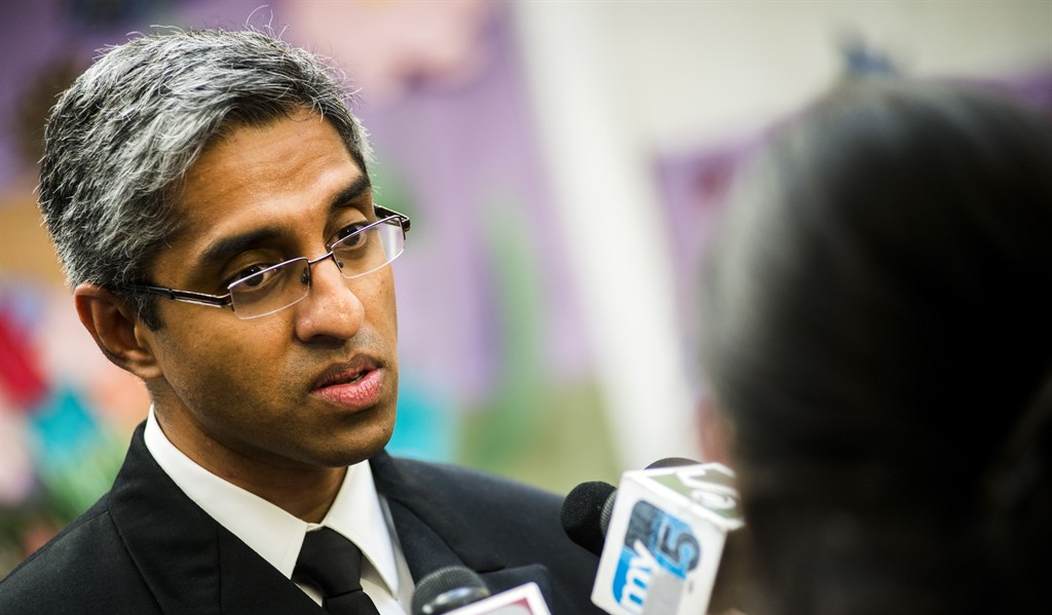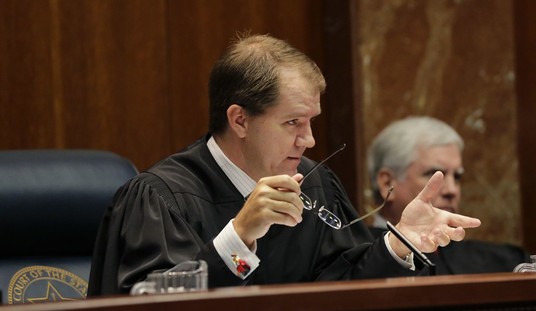There's something decidedly strange about the treatment Surgeon General Vivek Murthy is proposing to combat what he calls a public health crisis of "gun violence". While Murthy made juvenile gun violence a centerpiece of his call to action, his remedies are almost exclusively aimed at adults and their Second Amendment rights. Juveniles can't lawfully acquire a firearm under federal law, so what is the point of calling for "universal" background checks? Modern sporting rifles are used in only a handful of crimes, according to the FBI, so why is Murthy calling for them to be banned? And why, when juvenile gun violence is declining, according to the Surgeon General's office, is Murthy just now designating gun violence as a public health crisis?
It's simple. Murthy's using his position as Surgeon General to stump for Joe Biden's gun control agenda. Virtually every one of Murthy's proposals parrots Biden's frequent calls for Congress to enact new restrictions on the right to keep and bear arms: "safe storage" laws, "universal" background checks, "red flag" laws, bans on semi-automatic rifles and "large capacity" magazines, and restrictions on concealed carry.
Murthy's prescriptions are the same old stale talking points we've heard time and again from anti-gun politicians and the gun control lobby. The message isn't new, only the messenger. And just like Murthy's pals at the Bloomberg School of Public Health and the White House Office of Gun Violence Prevention, the Surgeon General myopic focus on attacking the Second Amendment ignores a couple of basic steps that we can and should be taking to reduce violent crime involving juveniles.
First, and perhaps most importantly, we have to ensure there are consequences for these acts. Yes, the primary role of the juvenile justice system is rehabilitation, not incarceration, but all too often that seems to be used as an excuse to treat juvenile offenders with kid gloves. Take the recent comments by a Nashville judge who was responding to an increase in juvenile homicides, for instance.
"It’s always disturbing and I think it should be for an entire community when any child dies," said Juvenile Court Judge Shelia Calloway.
FOX 17 News sat down with Judge Calloway who says we can't arrest our way out of the problem.
FOX 17 News' Kylie Walker asked the judge, "What's your response to those who feel our judges are not imposing harsh enough sentences or that our children aren’t scared to commit crimes because the consequences aren't necessarily there, more so a slap on the wrist?"
There are different things we can do to make sure all of our youth are learning from their experience and not in a position where they’ll repeat the crimes again," said Judge Calloway. Judge Calloway says there are a number of programs in the court system from drug and alcohol addiction to gang resistance interventions. She feels it can be more beneficial than jail.
That may be the case for some juvenile defendants, but it's certainly not the case for all of them. And if we're specifically talking about reducing "gun violence" among juveniles, we can't keep giving young offenders a pass for their crimes. In Baltimore earlier this year, for instance, a 12-year-old was arrested after fleeing police in a stolen car, but according to CBS News police had to release him to his parents because of his age.
What happens when a 12-year-old uses a stolen car to smash through the front of a gun shop and steals $30,000 worth of merchandise? Chances are, not much of anything at all. Maybe a few years of supposedly supervised probation, but that's about it.
Even when juveniles have previously been arrested for violent crimes, the system all too often turns a blind eye. In Chicago, 16-year-old Raysean Comer has been charged with murdering 7-year-old Jai’Mani Amir Rivera while he was awaiting trial on felony charges of aggravated battery and possession of a stolen motor vehicle. According to officials, weeks before the shooting Comer cut off the ankle monitor he'd been ordered to wear and also failed to appear in court for a hearing on the earlier charges. Police didn't put out an APB or BOLO alert for Comer, nor did they actively try to find him and arrest him after his ankle monitor went dark. Only after the investigation into Rivera's murder pointed to Comer did authorities try to take him into custody.
There are a lot of juvenile offenders who simply don't take the juvenile justice system seriously, and for good reason. Ensuring consequences for violent crime would go a long way towards reducing gun violence among adolescents, but that's apparently too harsh for Murthy to even consider.
Murthy also ignores another proven strategy to reduce violent crime: education and training. The gun control lobby has taken an abstinence-based approach to "gun safety"; don't think about guns, don't talk about guns, and above all else, don't normalize guns. Long gone are the days when high schools in cities like Chicago and New York City boasted rifle teams. As a result, there's no place for juveniles to go to learn about real gun safety in many urban environments. Outside of the Big Apple, trap shooting is becoming one of the fastest-growing (and officially unrecognized) high school sports in the state, with almost 2,000 teens participating in the state championships held a couple of weeks ago, but students in the Bronx or Brooklyn have little opportunity to compete or be taught how to be safe and responsible with a gun.
Providing kids with those opportunities would go a long way toward re-establishing the culture of responsible gun ownership that the Democrats have destroyed in many deep blue enclaves. But Vivek Murthy isn't interested in rebuilding that culture, even though it would fit right in with a harm-reduction public health approach to gun violence. What Murthy is calling for isn't a public health approach at all... just a rebranding of the same old gun control efforts that groups like Everytown and politicians like Joe Biden have been demanding for years.









